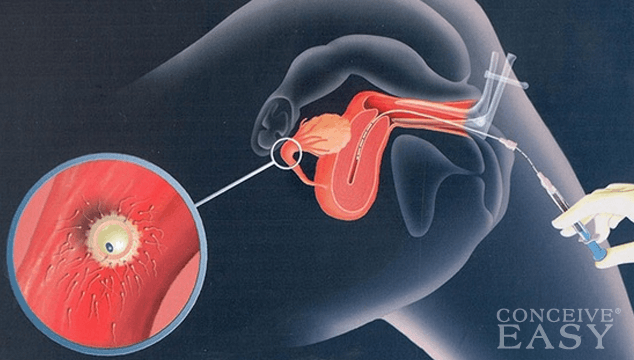Intrauterine insemination (IUI) is a medical laboratory procedure which separates fast moving sperm from more shiftless or non-moving sperm. When the fast moving sperm is isolated from the other, it is placed into the woman’s womb at the ovulation time in the middle of the monthly cycle. Claim Your 20 Free Pregnancy Tests – Click Here

A woman may be recommended IUI if:
![]() Unexplained infertility occurs when trying to conceive
Unexplained infertility occurs when trying to conceive
![]() Ovulation problems affect the patient
Ovulation problems affect the patient
![]() The male partner confronts premature ejaculation or even impotence
The male partner confronts premature ejaculation or even impotence
![]() The woman has no known fertility problems, but she doesn’t have a male partner and she is trying to have a baby using donated sperm
The woman has no known fertility problems, but she doesn’t have a male partner and she is trying to have a baby using donated sperm

Before the IUI process, doctors make sure that patient’s fallopian tubes are open. A part of the assessment made by the fertility clinic is a tubal patency test. The health of the woman’s pelvis and the patency of her fallopian tubes are assessed with laparoscopy or dye testing.
![]() Laparoscopy is a medical procedure which involves a telescope being introduced into the abdomen.
Laparoscopy is a medical procedure which involves a telescope being introduced into the abdomen.
![]() Dye testing is based on the fact that when the tubes and pelvis are healthy, the dye is able to pass freely through both tubes. Any adhesion in the way might prevent the egg accessing to the tubes from the ovaries. This procedure has to be performed under a short general anesthesia.
Dye testing is based on the fact that when the tubes and pelvis are healthy, the dye is able to pass freely through both tubes. Any adhesion in the way might prevent the egg accessing to the tubes from the ovaries. This procedure has to be performed under a short general anesthesia.
Both these tests may show you have only one healthy tube open for the egg to come, although both ovaries function normally. IUI treatment is performed when ovulation is about to start, from the ovary located on the same side as the open tube.

Another essential requirement for IUI procedure is the quality of the sperm. There should be no problems regarding this issue in order to have the procedure performed. If the sperm count, sperm motility and morphology scores are low, intrauterine insemination (IUI) is not likely to work.

The intrauterine insemination procedure, when done properly, should not bother the woman at all, feeling little or no discomfort. For couples confronted with unexplained infertility, with the female aged under 35, who has been trying for 2 years, and the male with normal sperm parameters the chances are 10% per month of pregnancy and delivering a baby with the help of artificial insemination and Clomid treatment for up to 3 cycles (with a lower success rate after the first three attempts).










Comments